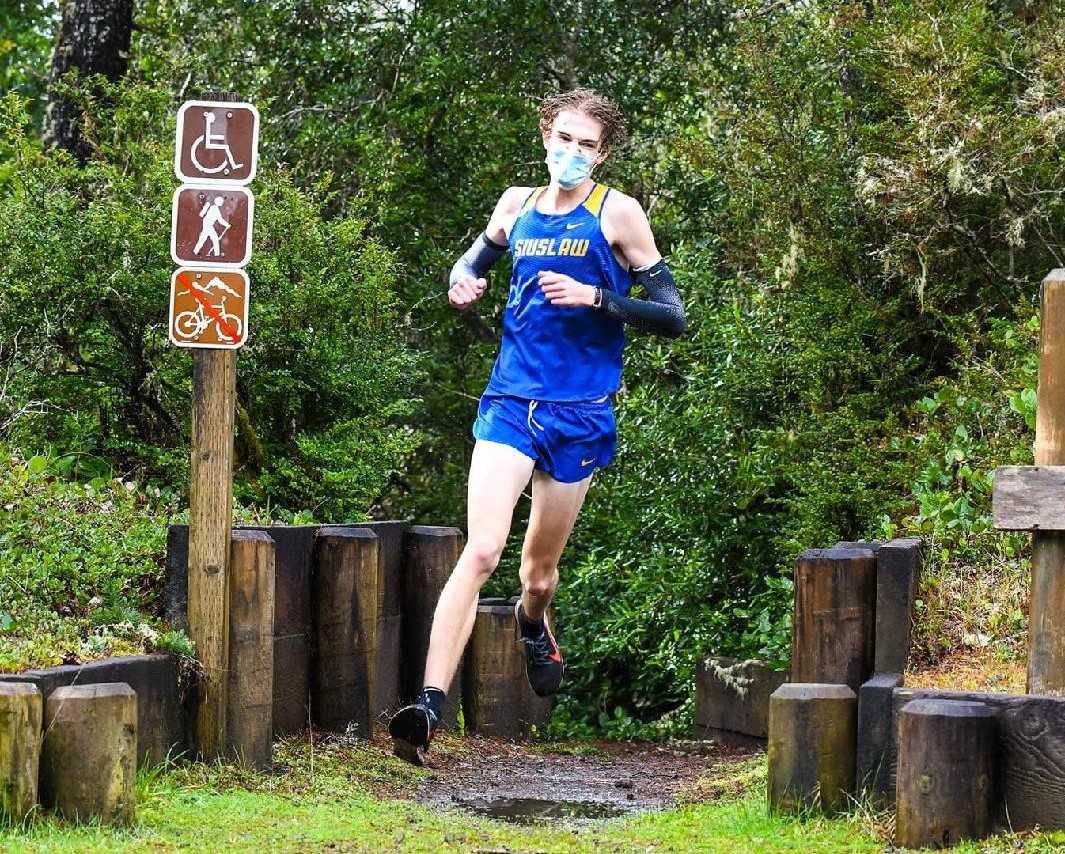
Cross country teams have some extra spring in their step after the state updated its COVID-19 guidance for outdoor sports last week.
Not only were several counties moved off the extreme-risk category, which caps gatherings at 50, but the restriction that limited meets to two schools was lifted.
It opens the door to bigger, more competitive meets, possibly even a state championship.
“It's baby steps,” Siuslaw coach Chris Johnson said. “Everything's encouraging. It's better than what we had.”
OSAA assistant executive director Brad Garrett, who oversees cross country, said the new guidance “took a burden off the small schools.” In many cases, a meet between two small-school teams might have as few as 10 runners, so not being able to have more teams created a barrier to staging meaningful meets.
“That didn't make much sense,” Garrett said.
Eliminating the team limit not only makes scheduling much easier, but it restores some authenticity.
"That instantly makes we way more excited about the season," North Salem coach Michael Herrman said. "That sounds more like real cross country when you're able to toe the line with more than just one team in a typical dual meet."
The biggest obstacle that remains is the gathering-size restrictions: 50 in extreme-risk counties, 75 in high, 150 in moderate and 300 in lower.
“There are still going to be modifications made, especially at larger events, to deal with gathering-size limitations,” Garrett said.
Cross country coaches have met with Garrett in a contingency group throughout the school year to discuss best practices, strategies and potential options for the season. One issue the coaches have made clear is their desire to have a state championship.
“Let's have the most normal possible state championship,” said Johnson, a member of the contingency group.. “It's 120 percent unanimous. We're all exactly on the same page, no question.”
The executive board meets Wednesday to decide the fate of the culminating weeks for the sports in Season 2, which begins March 1. The board could decide to go ahead with planning a state championship or return the week to the schools, who could do as they wish.
It's a complicated issue that doesn't lend to a one-size-fits-all solution.
“That's the onion there,” Garrett said. “Do you let some classifications have it but not others? Some activities but not others? We've got to get our schools decisions on this. And we need to know.”
When Garrett sketched out what a state meet could look like, it was a two-day event in a lower-risk county. Each of the nine championship races would have about 100 runners.
Johnson said he believes the OSAA should do whatever it takes to run a state meet.
“If it means you have to run one or two or three teams at a time, it doesn't make any difference,” Johnson said. “It if takes three or four days, to me, it doesn't make any difference. You could do it with 75 people, with no spectators. Even if you had to run two or three different races and then merge people, that would make everybody happy.”
Garrett said the OSAA can make an event work, but it's going to look much different.
“It's going to look pretty sterile,” Garrett said. “You show up to a parking spot, run, get back to your parking spot, leave. Which really goes against the essence of cross country. Everybody loves each other, they root for each other. That's not going to be happening under these guidelines.”
A venue in a lower-risk county makes the most sense, according to Garrett.
“There's plenty of space out there to run a cross country meet, but then the problem becomes, who's actually going to show up?” Garrett said.
Travel shouldn't be an issue, Johnson said.
“If we all had to go to Hermiston for a state meet, we'd get in a bus and we'd drive to Hermiston,” Johnson said. “If that made it easier to make it be a real meet, I don't think anybody would complain. It would be logistically difficult to try to get kids in hotel rooms over there, but I think it would be a dream to have something normal.”
Qualifying for the state meet would be complicated considering that schools in some areas have committed to compete only in regional “bubbles.” If the usual district qualifying method isn't possible, an alternate plan would be required. It also could mean that teams might have to settle for a regional type of championship event.
Herrmann -- whose team is in the Salem-Keizer School District, one of the competitive bubbles -- said "it would be a shame" if schools couldn't figure out a way to have district and state meets.
"I think those things are incredibly do-able," Herrmann said. "The two big criteria are that you have some level of individual qualification and state qualification. If they have to be creative on the limitations for those things, or how you qualify, I'm totally open to bending however we have to bend to make it happen."
Cross country teams were disappointed that Gov. Kate Brown and the Oregon Health Authority did not grant a request for a waiver of the mask requirement for runners. Athletes have worn masks during practices and competitions throughout Season 1 and it has been a burden for them.
“We made some ground last week, but we just didn't gain any in that area,” Garrett said.
Johnson said the mask requirement puts coaches in a difficult position.
“It's a tough place to be as a coach to ask kids to do something that's so uncomfortable,” Johnson said. “It's really hard not to tell the kids just to take them off. The problem is, once it's a rule, it's a rule, and you have to enforce it. It's a respiration type of sport, and not having all of your oxygen, it's not really that fair.”
Regardless, cross country teams will find a way to make do. Looking at the bigger picture, having a season is a blessing in itself. Having a state championship would be icing on the cake.
“To me, that's the biggest thing,” Johnson said. “In all this mess, how awful this all is, what a great silver lining that you could actually crown a couple state champions in certain sports.”
Garrett is optimistic, but also trying to manage expectations.
“Some are so caught up in the blue trophy,” Garrett said. “I don't know if this is a year we should be giving trophies, for truncated seasons.
“The attitude that wouldn't be good is we're going to have a championship, no matter who shows up. We're trying to make sure that everybody gets the opportunity to show up, not, hey, you've got to find a some way to get there.”











